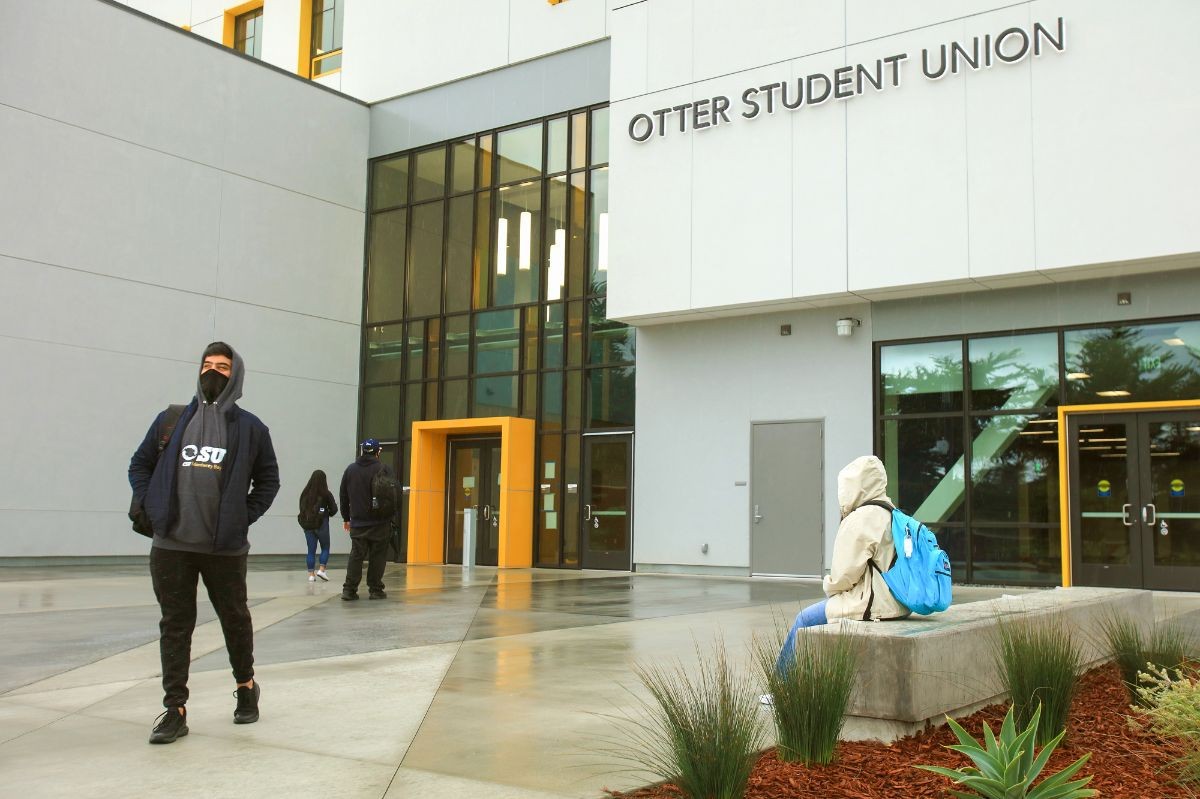Earth Day, Every Day

Photo by: Randy Tunnell All new buildings at CSUMB, including the Otter Student Union, are designed to meet the U.S. Green Building Council’s Leadership in Energy and Environmental Design (LEED) standards.
April 19, 2021
CSUMB dedicated to sustainability as vital part of core mission
By Sophia Huang McKenzie
Growing out of the first observance in 1970, Earth Day 2021: “Restore Our Earth” on April 22 will involve more than one billion people in 192 countries, making it the largest civic observance in the world, organizers say. At CSU Monterey Bay, integrating environmentalism and sustainability into all areas of our campus every day is a vital part of our core mission to serve students. CSUMB wants to ensure that the grandchildren and great-grandchildren of our current students will continue to thrive at CSUMB for generations to come, university leaders say.
“Cal State Monterey Bay is committed to making operational and academic decisions that have beneficial impacts on our region,” President Eduardo M. Ochoa said. “Climate change poses real challenges for our society, and [we are] uniquely positioned to lead through education and innovation."
CSUMB knows that our students care about the natural world and our planet. In a 2019 Student Experience Survey, over 60% of students indicated that sustainability was an important or very important factor in their decision to attend CSUMB. The percentage was even higher for under-represented minority students, students with lower GPAs, and students with Pell grants, according to the Office of Inclusive Excellence and Sustainability.
“Coalescing campus action around sustainability does so much more than support our values and strategic plan. Meeting these goals and leading by example shows our students and our regional community that we care about the future of their world and we will work hard to protect, and improve the natural environment and the social fabric upon which we all rely,” Sustainability Director Lacey Raak said.
Of course, students are a critical part of the university’s efforts. Student employees support projects, reporting, communications and outreach. In addition, partners across campus, such as the Environmental Affairs Committee in Associated Students, have critical roles to play.
Inclusive Sustainability Plan
CSUMB launched its Inclusive Sustainability Plan in 2020 with three ambitious goals: achieve carbon neutrality, 90% waste diversion, and plant 2,030 trees, all by 2030. During the pandemic this past year, CSUMB has saved about $5,000 a month and 28,000kWh by shutting off around 1,900 appliances throughout campus.
“We are already taking action in support of achieving these goals, composting will be expanding campus wide over the next couple years, and we are mapping and researching the best locations for planting trees, as well as examining system and infrastructure improvements to reduce our reliance on natural gas, a critical step to achieving carbon neutrality,” Raak said.
The university also launched a Sustainability Certificate this semester to educate, encourage and motivate actions to support sustainability. The program aims to provide a professional development opportunity for faculty and staff, although students may also participate.
History of Environmentalism
The university has historically taken concrete steps to guide and improve its sustainability efforts. The Sustainability Office was formalized in 2015, when Raak joined the university staff. However, progress in sustainability began long before, with numerous staff and faculty taking leadership roles to advance sustainability efforts on campus, she said.
The Sustainability Office joined forces with the Office of Inclusive Excellence in Summer 2020, reflecting the integrated nature of sustainability to the campus community as well as the intersectional efforts between sustainability, social justice, equity and environmental performance.
CSUMB’s Master Plan updated in 2017 creates the foundation for smart, sustainable growth. It identifies best practices in sustainability and transportation, protects the natural environment, increases public and car-free areas, and determines locations of future classrooms, offices, and research spaces. All new buildings are designed to meet the U.S. Green Building Council’s Leadership in Energy and Environmental Design (LEED) standards.